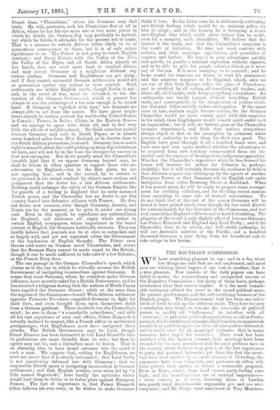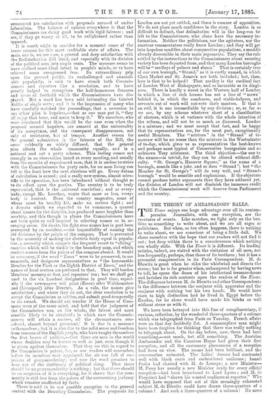THE BOUNDARY COMMISSION.
WE have something pleasant to say; and in a day when few things are said that are not unpleasant, and most men are whining about bogeys of one sort or another, that is
a true pleasure. Few readers of the daily papers can have failed to notice the extraordinary and unexpected success of the Boundary Commission ; but many of them have, perhaps, overlooked what that success implies: it is the most remarkable testimony offered for years to the sound political sense, the patient good-temper, and the self-sacrificing fairness of the English people. The Commissioners' task has been one calculated of itself to stir up the bitterest strife. They have to carry a revolution into detail, to remake the reservoirs of political power, to modify all " influences," to interfere with all interests,' to pulverise political organisations as old as Parliament, to divide counties, to separate allied families, to impoverish hundreds of political agents, to drive all wire-pullers distracted, and to settle, once for all, municipal jealousies that in many instances have raged for centuries. Their work has been watched with the keenest interest, their meetings have been attended by the most prominent and the most partisan men in the country, every decisien they give is of the last importance to party and personal interests ; yet from the first the meetings have been marked by an entire absence of ill-feeling, the arguments have been temperate, and partisans on either side have quitted their parties to defend a reasonable proposal. Even in Essex, where, from local causes, party-feeling runs high, and the boundary-lines are of unusual importance— a mere swerve, as it were, throwing slices of London into purely rural districts—the arguments pro and con were temperate ; and Mr. Coope, most convinced of Tory Members, announced his satisfaction with proposals accused of undue Liberalism. The balance of opinion everywhere is that the Commissioners are doing good work with rigid fairness ; and are, if they go wrong at all, to be enlightened rather than opposed. It is worth while to consider for a moment some of the lesser reasons for this most creditable state of affairs. The main one is, we are sure, a general and deep satisfaction with the Redistribution Bill itself, and especially with its division of the political area into single seats. The measure seems to have realised some ideal latent in people's minds, or to have relieved some unexpressed fear. Its extraordinary grip upon the general public, its unchallenged and unassailable popularity, is said to have struck both Commissioners and reporters like a revelation, and to have greatly helped to strengthen the half-humorous firmness and sense of foothold which the Commissioners have displayed. Not a word has been said intimating the faintest dislike of single seats ; and it is the impression of many who have carefully watched the proceedings, that a reversion to any other plan is hopeless,—that as one man put it, "they all enjoy that bone, and mean to keep it." We ourselves, who were convinced that this would be the case even when the proposal seemed hopeless, are amazed at the universality of its acceptance, and the consequent disappearance, not only of resistance, but of temper. Another reason for the general submission is the fairness of the Bill, the sense evidently so widely diffused, that the general plan affects the whole community equally, and is a national and not a party scheme. This feeling comes out strongly in an observation heard at every meeting, and usually from the mouths of experienced men, that it is useless to strive with the Commissioners for party ends, for no man living can tell in the least how the next elections will go. Every datum of calculation is erased ; and a really new system, almost scientific in its operation, has been introduced without thought as to its effect upon the parties. The country is to be truly represented, that is the universal conviction ; and as everybody, except Mr. Lowther, wants that more or less, everybody is content. Even the country magnates, some of whom must be terribly hit, snake no serious fight ; and a dispute which we expected to he venomous, a quarrel about names for the districts, has produced more laughter than acerbity, and this though in places the Commissioners have not been quite so well inspired in selecting names as in arranging areas. No doubt, the fight over names has in part been prevented by an accident,—the impossibility of naming the old divisions by the points of the compass. That is prevented by the necessity of making the districts fairly equal in population, a necessity which compels the frequent resort to "slicing" counties which will be visible in the boundary map, and which renders names from the points of the compass absurd. It would bs necessary, if the word "Essex" were to be preserved, to use numerals, and designate representatives as " the honourable Member for the First or the Eighth District of Essex," and the names of local centres are preferred to that. They will burden Members' memory at first, and reporters' too ; but we shall get used to the six hundred designations in good time, especially if the newspapers will print (Essex) after Walthamstow and (Liverpool) after Everton. As a rule, the names give satisfaction ; and where they do not, the clear resolution is to accept the Commission as arbiter, and submit good-temperedly to its award. We should not wonder if the House of Commons were of the same mind, and held that the judgment of the Commission was, on the whole, the fairest and most sensible likely to be obtained ; in which case the Commissioners will attain a success, all the circumstances considered, almost beyond precedent: It is due in a measure to themselves ; but it is also due to the solid sense and freedom from rancour of the English people, who have taught themselves the first lesson of politics,—that there are men in the world whose decision may be honest as well as just, even though it be given against themselves. That they see this in regard to the Commission is patent, for, as our readers will remember, before its members were appointed, the air was full of suspicions of gerrymandering ; and now the word promises to drop out of the dictionary of political slang. That there aboul t be no gerrymandering is nothing ; but that there should be no suspicion of it is everything, for it shows that the community is still free from the poison of the unreasoning jealousy which remains unaffected by facts. There is said to be one possible exception to the general content with the Boundary Commission. The proposals for London are not yet settled, and there is rumour of opposition. We do not place much confidence in the story. London is so difficult to delimit, that delimitation will in the long-run be left to the Commissioners, who alone have the necessary information. Neither the politicians, nor the agitators, nor the amateur commentators really know London ; and they will get into hopeless muddles about comparative populations, a muddle already discernible in their main arguments. They say the rule settled by the instructions to the Commissioners about securing variety has been departed from, and that many London boroughs will be " medleys of palaces and slums." That is certainly true of our own borough, "Strand," as it is curtly named, in which Clare Market and St. James's are both included ; but, then, how is that to be helped ? That medley is the cardinal fact of London West of Bishopsgate, and as incurable as its dinginess. There is hardly a street in the Western half of London in which a line of rich houses has not a line of "mews" behind it, in which the coachmen, and stable-helpers, and servants out of work will out-vote their masters. If that is an evil, it is one irremediable by any division ; or, so far as we see, by any scheme whatever short of a classification of electors, which is at variance with the whole intention of the reform, and will not be so much as discussed. London is a mixture ; and we must accept that fact., and be happy that its representatives are, for the most part, exceptionally useful Members. The " mixture" in the " Strand" of tomorrow will be no worse than the mixture in the Westminster of to-day, which gives us as representatives the best-known and perhaps most typical of Conservative bourgeoisie and an unknown Tory aristocrat. The third objection—the one to the names—is trivial, for they can be altered without difficulty. " St. George's, Hanover Square," as the name of a borough, sounds like a joke, and so does " Strand"; but "the Member for St. George's " will do very wall, and " Strandborough " would be sensible and euphonious. If the objectors cannot produce better arguments than they have adduced yet, the division of London will not diminish the immense credit which the Commissioners' work will deserve from Parliament and the country.



































 Previous page
Previous page